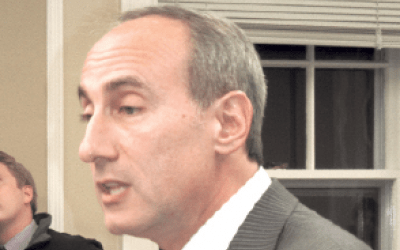
The Town of North Hempstead board voted unanimously on Wednesday night last week to create a special park district to renovate the recreation facilities at the Roslyn Country Club at a cost of $7.5 million.
The board’s decision, which came at the conclusion of a special public hearing, paves the way for the restoration of a pool and tennis courts that have fallen into disrepair in recent years as part of what the town is now calling Levitt Park at Roslyn Heights Park District.
“This really is a historic moment,” Town of North Hempstead Supervisor Jon Kaiman said after the vote.
The town board had voted in June to approve the purchase of the 7.3-acre property on which the recreation facilities are located from owner Manoucher Malekan for $2 million using a town environmental legacy fund. Malekan would retain ownership of the Royalton at Roslyn Heights, a catering facility on 2.7 acres of the property, under a proposal that has been agreed to but not yet signed.
If approved, the park would be open to 728 Roslyn Heights households located in the development built by Levitt & Sons in the 1950s that surrounds Roslyn Country Club as well as 250 to 350 town residents outside the park district, who would pay membership fees. Residents in the park district would pay an average of $800 to $1,000 per year for the debt service on the $7.5 million bond the town board plans to issue to renovate the pool and tennis courts.
Malekan shuttered the recreation facilities several years ago after he and the Roslyn Country Club residents could not agree on membership fees.
Town Councilman Thomas Dwyer called the park district “a very good solution” for the community. Dwyer described the current condition of the pool as “a hole in the ground with weeds growing out of it.”
Dwyer and Kaiman proposed the special district after civic association leaders filed petitions for a referendum challenging a town council vote to create a town park on the site. The civic association leaders expressed concerns that town taxpayers would be on the hook if membership fees did not cover the cost of the $7.5 million bond that would be issued to restore the facilities.
As part of the special district plan, Kaiman and Dwyer presented an option to 300 Roslyn Heights residents in October tto create a year-round facility with a covered pool and tennis courts at a cost of $15 million.
Kaiman said that while the plan for a year-round facility was not considered by the town council enhancing the special district’s amenities are an option for future consideration.
“If the community concludes over time it should include those amenities, they can do so,” he said.
Gerard Terry, special counsel to the town attorney, said the town could exceed the $7.5 million to be spent on the renovation of the facilities.
Todd Zarin, president of the Roslyn Club Civic Association, asked the board to be “parsimonious” in running the park district, but said a year-round grill room and basketball court should be included in the plan.
“Our community has seen an operating club and it seems to me they want to see that again,” Zarin said.
Roslyn Country Club resident Diane Hirsch said the Roslyn School District lost 100 students and revival of the recreation facilities could help reverse that trend.
“It’s about building a valuable community,” she said.
Most of the Roslyn Heights residents who spoke at the special hearing expressed unqualified support for reviving the recreation facilities, which were originally included as community amenities at an annual cost of $100 per family when Levitt & Sons built the development in the 1950s.
But several elderly residents raised objections to enduring tax increases for recreation facilities they wouldn’t utilize.
“People should not be forced to pay taxes for facilities they don’t want and don’t intend to use,” Roslyn Country Club resident Pat Gilmore said, adding that residents should have an option for an exemption from the taxes to support the special district.
Sy Buckner, a resident since 1950, said his children had enjoyed the benefits of the pool and tennis courts and said children should have “the same facility,” but suggested residents who want the recreation facility should pay for it through dues.
Kaiman indicated that wasn’t possible to exempt residents within the district from the taxes, saying, “It would not be appropriate to carve people out and exempt them from participating in this, but we will address them individually going forward.”
After the hearing, Kaiman said the town will “explore ways to mitigate this,” possibly enabling residents to sell their rights to use the recreation facilities.
The issue of usage rights has been a prominent issue since 238 residents filed individual lawsuits against Malekan invoking easement rights included in their respective deeds after the recreation facilities were closed. Malekan has said the lawsuits must be dropped before he would sell the property to the town.
During the hearing, Kaiman said the easements “end here,” explaining afterward that creation of the special district “negates the relevance of the easements.”
He said he thinks the town can close on purchasing the property from Malekan in the next 30 days.
Both Republicans on the town board expressed their support for the special district before the vote for what had been a Democratically-driven initiative.
Town Councilman Angela Ferrara reiterated that he was “totally opposed” to a town park, but said he was “committed” to the park concept.
Councilwoman Dina De Giorgio called the special district plan a “fair compromise.”
Edward Scott, who gathered petition signatures to force a referendum on the town park proposal as president of the Albertson Civic Association, said he was pleased with the result.
“I’m glad this thing has been solved,” he said.






